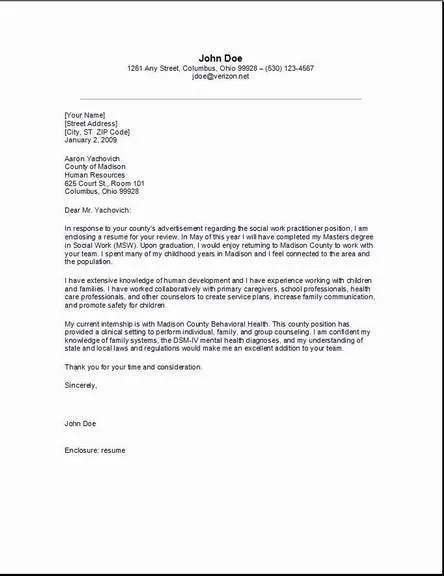What is a Cover Letter and Why Does it Matter for RNs?
A cover letter for a Registered Nurse (RN) is a crucial document accompanying your resume when applying for nursing positions. It serves as your initial introduction to a potential employer, allowing you to expand on your qualifications, experiences, and career aspirations in a more personal and engaging manner. Unlike a resume, which provides a concise overview of your professional history, a cover letter offers the opportunity to showcase your personality, communication skills, and enthusiasm for the role and the healthcare facility. A well-crafted cover letter can significantly increase your chances of securing an interview and ultimately landing your dream nursing job. In a competitive job market, a cover letter can be the differentiating factor that sets you apart from other applicants with similar qualifications.
The Importance of a Cover Letter for Registered Nurses
For Registered Nurses, a cover letter is more than just a formality; it’s a strategic tool to highlight your suitability for a specific role. It allows you to connect your skills and experiences directly to the requirements of the job description, demonstrating your understanding of the healthcare facility’s needs. The cover letter demonstrates your communication skills, attention to detail, and writing proficiency, all of which are essential attributes for RNs. It provides a platform to express your passion for nursing, your commitment to patient care, and your alignment with the healthcare facility’s values. A compelling cover letter also allows you to address any potential gaps in your resume or explain career transitions, providing context for your professional journey. Therefore, a well-written cover letter is an essential component of a successful job application for RNs.
Key Components of a Standout RN Cover Letter
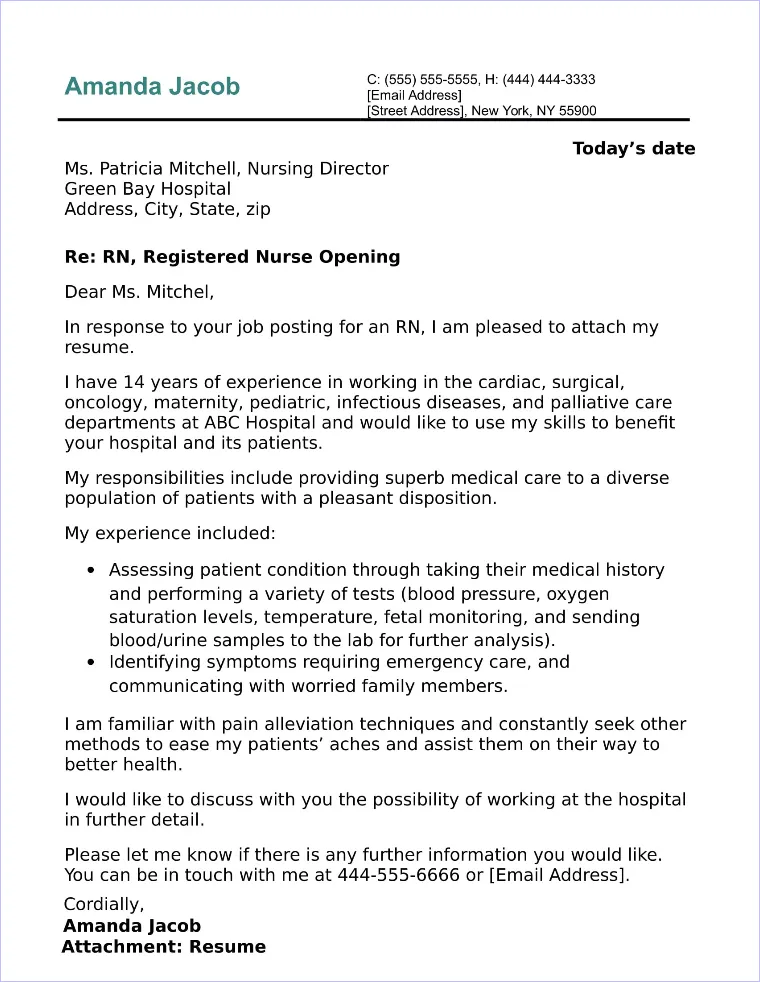
A standout RN cover letter should include several key components to effectively communicate your qualifications and enthusiasm. It should start with your contact information, followed by the date and the hiring manager’s information. The letter’s body should consist of an engaging opening statement, highlighting your most relevant skills and experiences. Focus on showcasing how your qualifications align with the job requirements and the healthcare facility’s mission. Include examples of your accomplishments and quantifiable results, demonstrating your impact in previous roles. Tailor your letter to the specific job and healthcare facility by researching their values, mission, and current needs. Finally, end with a strong call to action, expressing your interest in the position and your availability for an interview. Remember to proofread meticulously for any errors in grammar and spelling.
Contact Information and Formatting
Proper formatting and contact information are critical for making a professional impression. At the top of your cover letter, include your full name, address, phone number, and professional email address. Ensure the formatting is clear, easy to read, and consistent throughout the document. Use a standard font like Times New Roman, Arial, or Calibri, and maintain a font size between 11 and 12 points. Set your margins to one inch on all sides and use single-spacing within paragraphs with a double space between paragraphs. Use clear headings and bullet points to break up large blocks of text and make it easier for the reader to scan. The overall appearance of the cover letter should be clean, well-organized, and visually appealing, reflecting your attention to detail.
Writing the Perfect RN Cover Letter Header
The header is the first thing a recruiter sees, so it needs to be precise and professional. Start with your full name, centered at the top. Below your name, list your contact information including your phone number and a professional email address. Avoid using nicknames or unprofessional email addresses. Following your contact information, add the date. Directly beneath the date, include the hiring manager’s name (if known), their title, and the healthcare facility’s name and address. If you are unsure of the hiring manager’s name, research the facility’s website or LinkedIn to find it, or address the letter to ‘Hiring Manager’ to show you have done your research. The header should be well-formatted and aligned to maintain a professional look.
Opening Statement Grabbing Attention

The opening statement is your chance to make a strong first impression and capture the reader’s attention. Avoid generic greetings such as ‘Dear Sir/Madam.’ Instead, personalize your greeting, using the hiring manager’s name if possible. Start with a compelling hook, such as highlighting your years of experience, a key accomplishment, or your passion for nursing. Clearly state the position you are applying for and where you saw the job posting. Briefly mention how your skills and experiences align with the job requirements and the healthcare facility’s mission. Ensure your opening is concise, enthusiastic, and immediately demonstrates your interest in the opportunity. The goal is to make the hiring manager want to read further.
Highlighting Your Qualifications and Experience
This section is where you showcase your relevant qualifications and experience in detail. Carefully review the job description and identify the key skills and experiences the employer is seeking. Tailor your cover letter to highlight the experiences that directly match these requirements. Use specific examples to illustrate your abilities, such as clinical skills, patient care experience, or leadership roles. Quantify your accomplishments whenever possible, such as the number of patients you’ve cared for, successful outcomes you’ve achieved, or improvements you’ve made in efficiency or patient satisfaction. Mention certifications, licenses, and any specialized training relevant to the position. Structure this section logically, with clear headings and bullet points, to make it easy for the reader to follow and quickly assess your suitability for the role. Consider using the STAR method (Situation, Task, Action, Result) to structure your examples and provide a comprehensive view of your accomplishments.
Showcasing Your Skills and Accomplishments
Focus on showcasing your skills and accomplishments in a clear and concise manner. Begin by listing your core nursing skills, such as patient assessment, medication administration, wound care, and electronic health record (EHR) proficiency. Highlight any specialized skills, such as experience in a specific specialty like critical care, oncology, or pediatrics. Provide specific examples of your accomplishments, quantifying them whenever possible. For instance, mention how you reduced patient falls by implementing a new safety protocol or improved patient satisfaction scores through better communication. Emphasize skills that demonstrate your ability to collaborate effectively with a healthcare team, such as communication, teamwork, and problem-solving. Use strong action verbs to describe your accomplishments, such as ‘managed,’ ‘coordinated,’ ‘implemented,’ and ‘improved.’ This section should provide a detailed picture of your abilities and the value you bring to the healthcare facility.
Tailoring Your Letter to the Specific Job
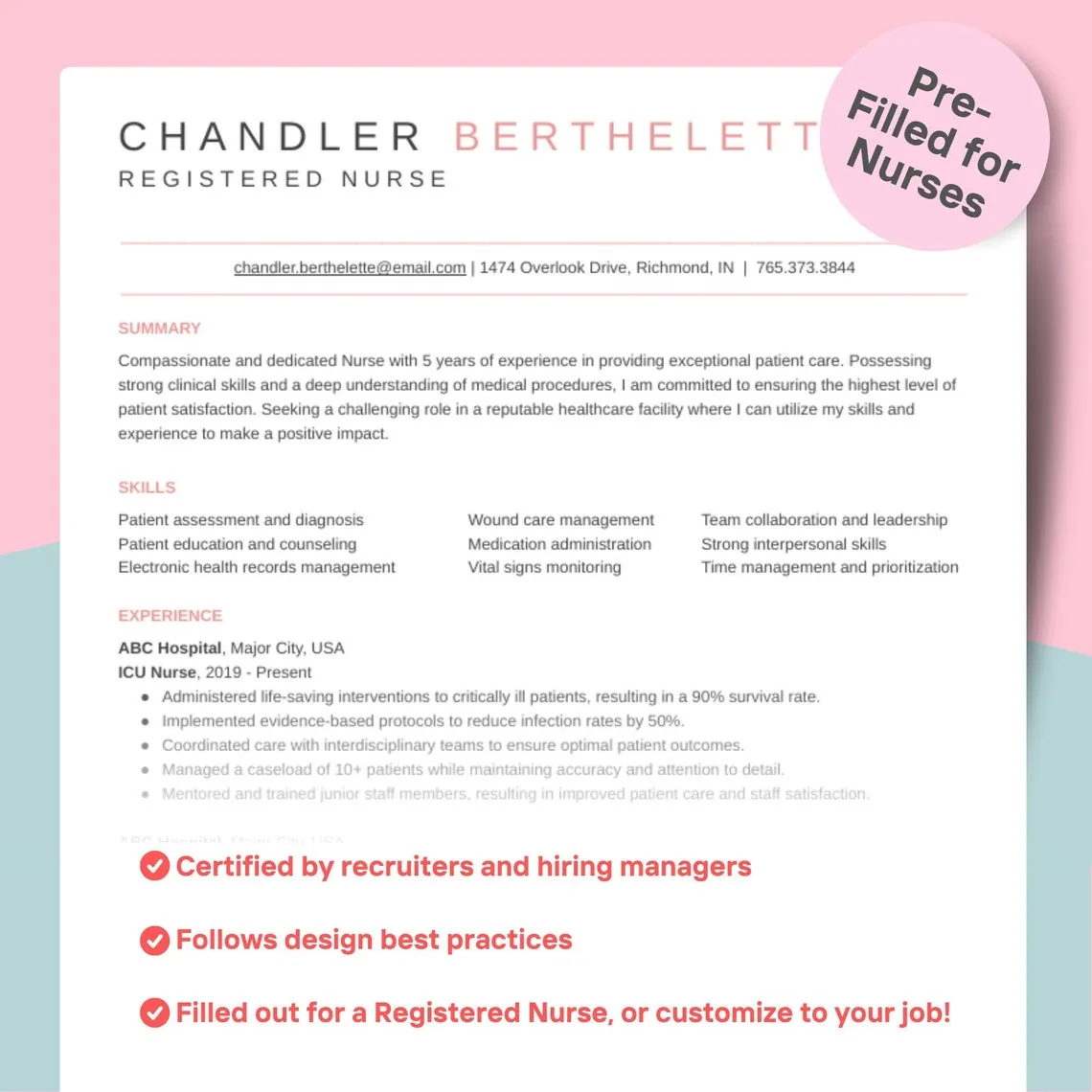
A generic cover letter rarely makes a strong impression. Customize your cover letter for each job application to demonstrate your genuine interest and suitability for the specific role. Carefully review the job description and identify the key requirements, skills, and experiences the employer is seeking. Research the healthcare facility’s mission, values, and the type of patients they serve. Tailor your letter to address these specific needs. Use keywords from the job description throughout your letter. Provide relevant examples that showcase how your skills and experiences align with the job requirements. Briefly mention how you can contribute to the facility’s goals. The goal is to show the employer that you’ve put thought and effort into your application and that you are a strong fit for their team.
Researching the Healthcare Facility
Thorough research is crucial to tailoring your cover letter and demonstrating your genuine interest in the healthcare facility. Visit the facility’s website to learn about their mission, values, and services. Look for recent news, initiatives, or awards that can inform your letter. If possible, review the facility’s social media presence to gain insights into their culture and values. Identify any specific challenges or goals that the facility is addressing, and consider how your skills and experiences can contribute to their success. Mentioning specific programs, initiatives, or values that resonate with you shows that you have taken the time to learn about the facility. Addressing these points demonstrates a genuine interest in the position, and shows that you are serious about your application.
Adapting to Different Nursing Specialties
Cover letters should be tailored to the specific nursing specialty you are applying for. Highlight the skills, experiences, and certifications that are most relevant to the specialty. For example, if applying for a critical care position, emphasize your experience with advanced monitoring equipment, ventilator management, and critical thinking skills. If applying for an oncology position, showcase your knowledge of chemotherapy protocols, patient support, and end-of-life care. For a pediatric nursing position, highlight your experience with children, your ability to communicate with families, and your understanding of pediatric-specific health conditions. Use the language and terminology specific to the specialty. Demonstrate that you have a clear understanding of the unique challenges and rewards of the specialty, and express your passion for providing specialized care in this field.
Demonstrating Your Passion for Nursing

Expressing your passion for nursing is essential. Share your enthusiasm for patient care, your commitment to providing quality care, and your dedication to the nursing profession. Mention what specifically drew you to nursing, whether it’s the opportunity to make a positive impact on patients’ lives, the challenge of solving complex medical problems, or the teamwork involved in healthcare. Show your commitment to continuous learning and professional development by mentioning any relevant certifications or training programs you’ve completed or plan to pursue. Express your commitment to ethical practice, patient advocacy, and adhering to professional standards. Your passion for nursing will make you stand out to employers, who seek dedicated and motivated healthcare professionals.
Emphasizing Soft Skills and Personality
While technical skills are important, emphasizing soft skills and your personality can significantly enhance your cover letter. Highlight your communication, teamwork, problem-solving, and critical-thinking abilities. Provide examples of how you have used these skills in previous roles. Mention your ability to build rapport with patients and their families. Express your ability to manage stress, handle difficult situations, and adapt to changing circumstances. Describe your work ethic, your ability to take initiative, and your commitment to professional development. The goal is to showcase not only your technical expertise but also your ability to thrive in a team environment and contribute positively to the healthcare facility’s culture.
Closing with a Strong Call to Action
Your closing paragraph should reiterate your interest in the position and express your eagerness for an interview. Thank the hiring manager for their time and consideration. Restate your key qualifications and emphasize why you are the best fit for the role. Provide your contact information again and state your availability for an interview. End your cover letter with a professional closing, such as ‘Sincerely’ or ‘Respectfully,’ followed by your full name. A well-written closing paragraph reinforces your enthusiasm, summarizes your key qualifications, and encourages the hiring manager to take the next step in the hiring process.
Proofreading and Editing Your Cover Letter
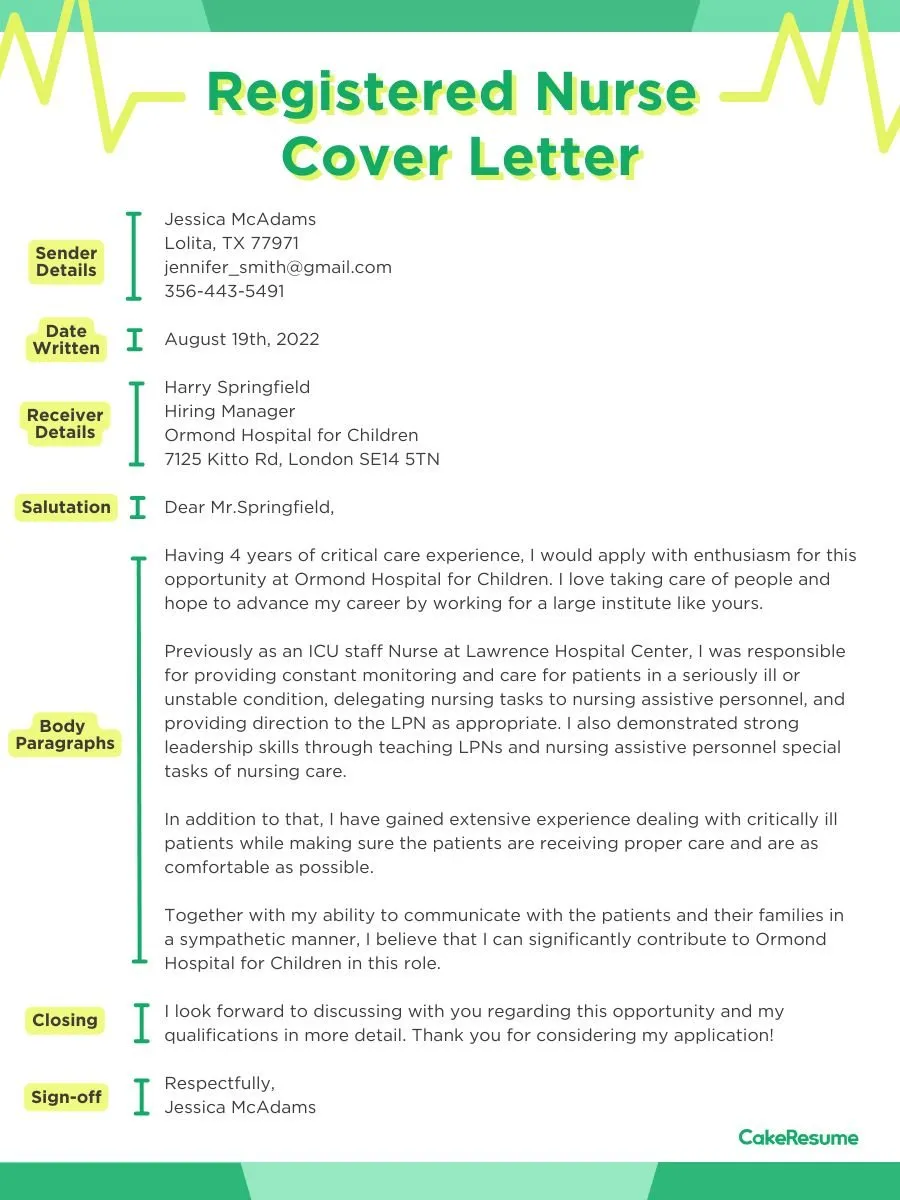
Before submitting your cover letter, thoroughly proofread and edit it for any errors in grammar, spelling, punctuation, or formatting. Errors can detract from your professionalism and create a negative impression. Use a grammar and spell-checker to catch obvious mistakes, but always review the letter manually to catch errors that automated tools may miss. Read your cover letter aloud to ensure it flows smoothly and makes sense. Ask a trusted friend, mentor, or career advisor to review your letter for feedback. They can provide a fresh perspective and help you identify areas for improvement. Ensure your contact information is correct and up-to-date. Pay close attention to the language used, and confirm you have a clear and concise style. This process ensures your cover letter reflects your attention to detail and professionalism.
Common Mistakes to Avoid in RN Cover Letters
Avoid several common mistakes to ensure your cover letter is effective. Do not use a generic cover letter without tailoring it to each specific job. Refrain from simply repeating your resume. Avoid writing a cover letter that is too long. Keep your letter concise and to the point, ideally within one page. Never include negative information about previous employers or colleagues. Ensure you avoid grammatical errors or typos. Refrain from using overly casual language, slang, or abbreviations. Avoid focusing solely on what you want. Instead, focus on how you can contribute to the healthcare facility. Finally, do not omit a call to action, expressing your interest in an interview and your availability.
Using Strong Action Verbs
Using strong action verbs can significantly enhance your cover letter and make your accomplishments more compelling. Action verbs help to demonstrate your skills, experience, and accomplishments concisely and powerfully. Start each bullet point or sentence describing your accomplishments with an action verb. For example, instead of writing ‘Responsible for patient care,’ write ‘Administered patient care.’ Other examples include ‘managed,’ ‘coordinated,’ ‘implemented,’ ‘developed,’ ‘improved,’ ’led,’ ’trained,’ and ‘assessed.’ Using dynamic verbs helps create a vivid and impactful portrayal of your capabilities. Choose verbs that are appropriate for the specific tasks and responsibilities described. This will create a more memorable and impactful cover letter.
Formatting and Design Tips
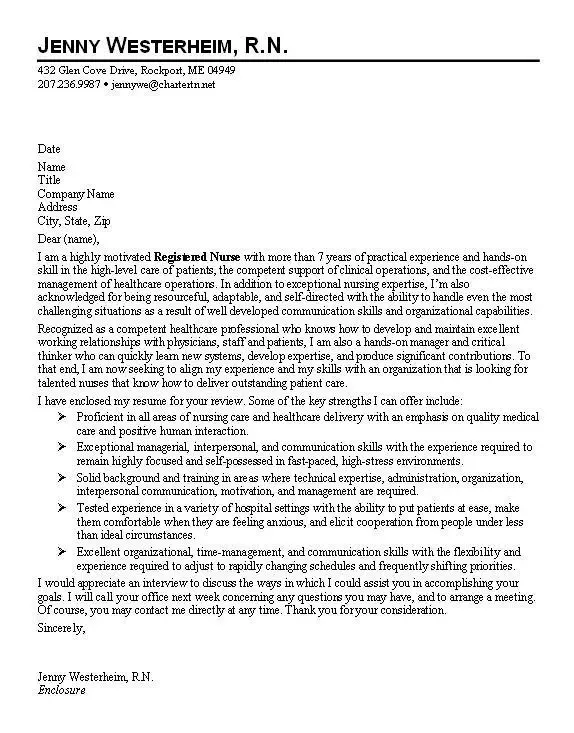
Proper formatting and design contribute to a professional and readable cover letter. Use a standard, easy-to-read font such as Times New Roman, Arial, or Calibri. Keep the font size between 11 and 12 points. Maintain consistent margins of one inch on all sides. Use single-spacing within paragraphs, but double-space between paragraphs. Use clear headings and bullet points to organize information and make it easier for the reader to scan. Ensure your cover letter is well-structured and visually appealing. The design should complement the content, making it easy to read and follow. Avoid using overly elaborate fonts, colors, or graphics, which can distract from the content. The goal is to create a cover letter that is both informative and visually professional.
Cover Letter Examples for RNs
Reviewing cover letter examples can provide valuable guidance on how to structure your own letter and showcase your qualifications effectively. Look for examples tailored to your specific nursing specialty and experience level. Pay attention to how the applicants highlight their skills, experiences, and accomplishments. Study the language used, and the overall tone and style of the letter. Customize example cover letters to match your own qualifications and experiences. Use these examples as templates, but make sure you don’t simply copy and paste. Tailor each aspect of the cover letter to your specific details. Examples from websites, career resources, and nursing organizations can be useful resources.
Example Cover Letter for Experienced RN
An experienced RN cover letter should emphasize extensive clinical expertise, leadership experience, and any specialized certifications. The letter must begin with a strong opening statement that highlights years of experience and key achievements. Clearly state the position and facility you’re applying for. Highlight specific accomplishments and results. Quantify your contributions with data. For example, you might mention the number of patients you have cared for, the successful outcomes you achieved, or the improvements you made in patient satisfaction. Tailor the content to the job description. Use action verbs to describe your accomplishments, and showcase any leadership experience. Closing with a strong call to action, expressing your interest and availability for an interview.
Example Cover Letter for New Grad RN
A cover letter for a new grad RN should focus on highlighting relevant clinical experiences, education, and any clinical rotations. It must begin with an enthusiastic opening and state the position and facility you are applying for. Emphasize skills and experiences gained during nursing school and clinical rotations. Mention any honors, awards, or academic achievements. Describe relevant coursework and clinical experiences. Showcase your passion for nursing and your commitment to providing excellent patient care. Show how your skills match the facility’s needs. Mention any certifications or licenses. The closing paragraph should express your enthusiasm and availability for an interview, demonstrating your eagerness to start your nursing career.
Frequently Asked Questions about RN Cover Letters
Many nurses have questions about their cover letters. Here are some of the frequently asked ones: How long should a cover letter be? Aim for a one-page cover letter. What is the best format for a cover letter? Use a standard business letter format. What should I include in the opening paragraph? Include the position you’re applying for, where you found it, and a brief overview of your key skills. How important is it to tailor the cover letter? It is extremely important. It demonstrates your interest in the facility and that you meet the job requirements. Should I mention my salary expectations? It’s best to avoid salary expectations unless specifically requested. Can I use a template? Templates are a good starting point, but they must be customized to fit you. What should I do after submitting my cover letter? Follow up a week or two later to confirm the employer received your application.
